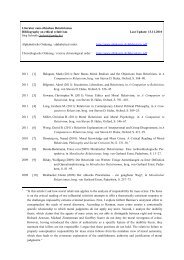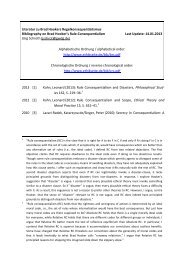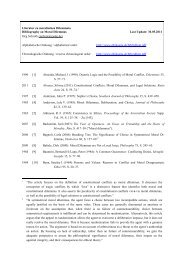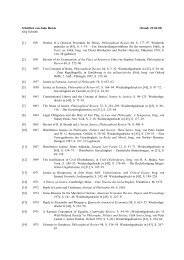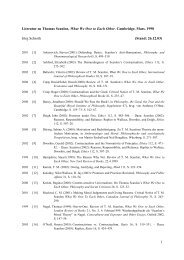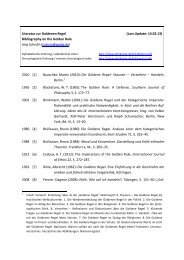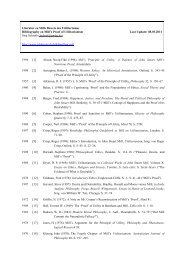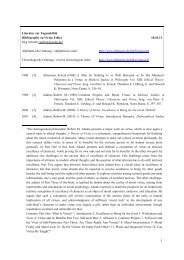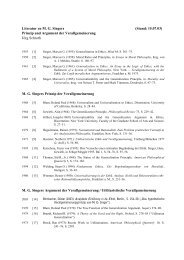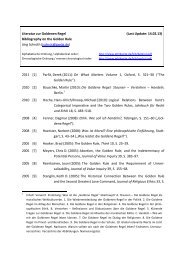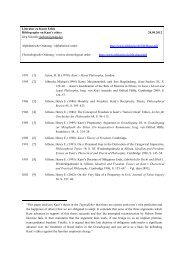Chronologische - Ethikseite
Chronologische - Ethikseite
Chronologische - Ethikseite
You also want an ePaper? Increase the reach of your titles
YUMPU automatically turns print PDFs into web optimized ePapers that Google loves.
2008 [185] Cummiskey, David (2008): Dignity, Contractualism and Consequentialism, Utilitas 20, S.<br />
383–408. 53<br />
2008 [186] Darwall, Stephen (2008): Kant on Respect, Dignity, and the Duty of Respect, in Kant’s Ethics<br />
of Virtue, hrsg. von Monika Betzler, Berlin, S. 175–99.<br />
2008 [187] Denis, Lara (2008): Individual and Collective Flourishing in Kant’s Philosophy, Kantian<br />
Review 13, S. 82–115.<br />
2008 [188] Denis, Lara (2008): Kant and Hume on Morality, in Stanford Encyclopedia of Philosophy,<br />
hrsg. von Edward N. Zalta, http://plato.stanford.edu/entries/kant-hume-morality/.<br />
2008 [189] Fenner, Dagmar (2008): Ethik. Wie soll ich handeln?, Tübingen, S. 100–106 („Kants<br />
Verfahren logischer Universalisierung“).<br />
2008 [190] Ferreira, Sofia Helena Gollnick (2008): Kant’s Concept of Moral Character, in Recht und<br />
Frieden in der Philosophie Kants. Akten des X. Internationalen Kant-Kongresses,<br />
Band 3: Sektionen III–IV, hrsg. von Valerio Rohden, Ricarda R. Terra, Guido A. de<br />
Almeida und Margit Ruffing, Berlin, S. 107–15.<br />
2008 [191] Fricke, Christel (2008): Maximen, in Recht und Frieden in der Philosophie Kants. Akten des<br />
X. Internationalen Kant-Kongresses, Band 3: Sektionen III–IV, hrsg. von Valerio<br />
Rohden, Ricarda R. Terra, Guido A. de Almeida und Margit Ruffing, Berlin, S. 125–<br />
36.<br />
2008 [192] Geiger, Ido (2008): How Do We Derive Moral Laws?, in Recht und Frieden in der Philosophie<br />
Kants. Akten des X. Internationalen Kant-Kongresses, Band 3: Sektionen III–IV, hrsg.<br />
von Valerio Rohden, Ricarda R. Terra, Guido A. de Almeida und Margit Ruffing,<br />
Berlin, S. 137–47.<br />
2008 [193] Grünewald, Bernward (2008): Wahrhaftigkeit, Recht and Lüge, in Recht und Frieden in der<br />
Philosophie Kants. Akten des X. Internationalen Kant-Kongresses, Band 3: Sektionen<br />
III–IV, hrsg. von Valerio Rohden, Ricarda R. Terra, Guido A. de Almeida und Margit<br />
Ruffing, Berlin, S. 149–60.<br />
2008 [194] Hallich, Oliver (2008): Die Rationalität der Moral. Eine sprachanalytische Grundlegung der<br />
Ethik, Paderborn, S. 570–83 („Kants Versuch der Kontingenzeliminierung“).<br />
2008 [195] Heil, Joachim (2008): Einleitung in die praktische Philosophie Kants, in Texte zur praktischen<br />
Philosophie: Kant. Ausgewählt und eingeleitet von Joachim Heil, London, S. XVII–<br />
LXVII.<br />
53 “Kantian respect for persons is based on the special status and dignity of humanity. There are, however, at<br />
least three distinct kinds of interpretation of the principle of respect for the dignity of persons: the<br />
contractualist conception, the substantive conception and the direct conception. Contractualist theories are<br />
the most common and familiar interpretation. The contractualist assumes that some form of consent or<br />
agreement is the crucial factor that is required by respect for persons. The substantive conceptions of<br />
dignity, on the other hand, treat the concept of dignity as a substantive value that justifies a deontological<br />
conception of respect for persons. A third conception of respect for the dignity of persons, the conception<br />
that I favor, focuses directly on the special value of our rational nature. According to this consequentialist<br />
conception, we respect the dignity of persons by promoting the flourishing of rational nature.”



